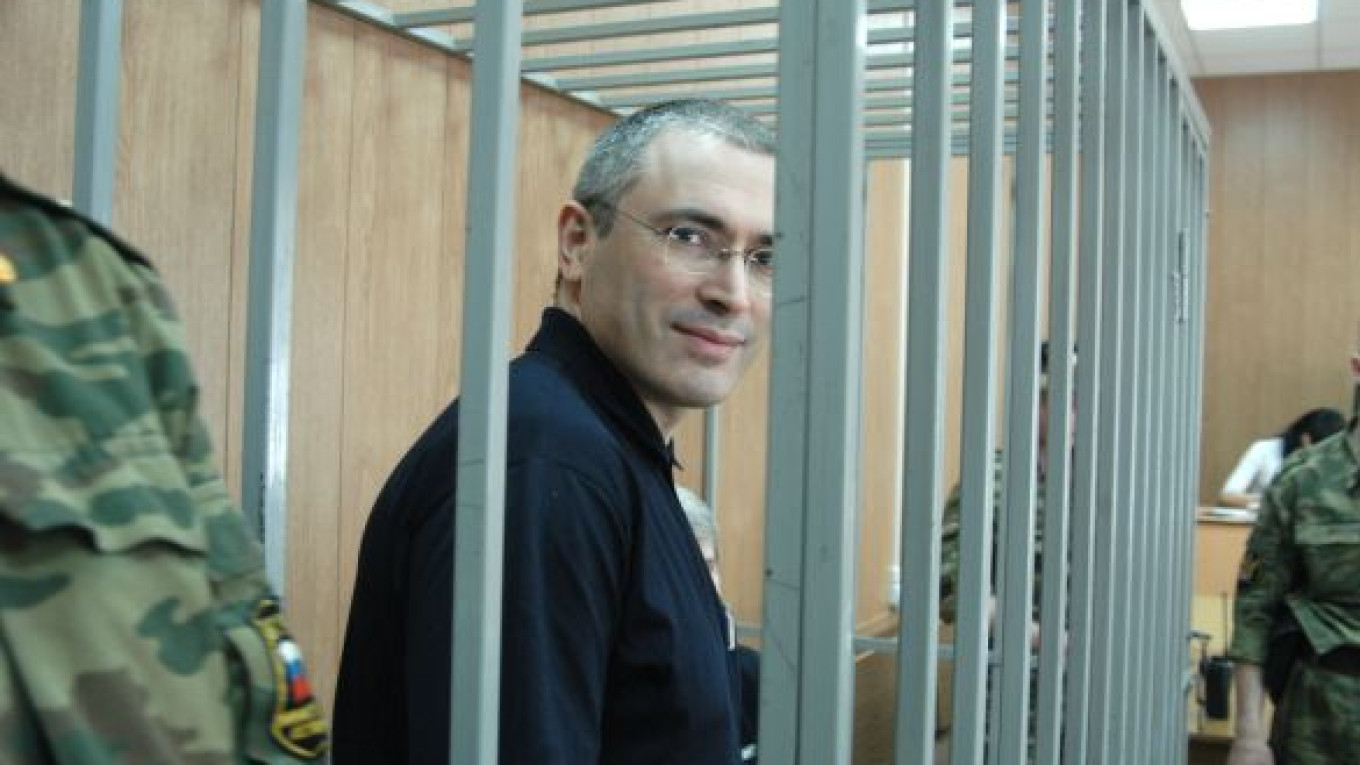In what might signal a sharp change in fortunes for Mikhail Khodorkovsky, President Vladimir Putin wished the jailed oil tycoon well on Thursday and a Moscow court ruled that he and his former business partner, Platon Lebedev, could walk free in 2014.
"May God bless him," Putin said about Khodorkovsky during an annual news conference, adding that he held no grudge against Russia's once-wealthiest man, now one of his biggest critics.
Khodorkovsky, who was jailed on tax charges as he bankrolled opposition political parties in the run-up to the State Duma election in 2003, is no longer a problem for authorities because new opposition leaders have emerged, independent political analyst Pavel Salin said.
"Those who don't like the authorities still might use him to rally around, but there are many others who can serve the same purpose," he said.
The Moscow City Court, ruling on an embezzlement conviction in a second trial in 2010, upheld the conviction but reduced the sentence from 13 years to 11, citing changes in economic crime legislation.
Khodorkovsky, 49, is now set for release on Oct. 25, 2014, and Lebedev on July 2, 2014, the Rapsi court news service reported. The court denied a request to release both defendants on time served, but the defense vowed to appeal the ruling.
Khodorkovsky's lawyer Vadim Klyuvgant welcomed the decision to reduce the sentence as "a little human relief," but said it had been timed to coincide with Putin's news conference, according to a statement on Khodorkovsky's website.
At the televised news conference, Putin referred to Khodorkovsky by his name and patronymic, Mikhail Borisovich, in a sign of respect. He had not been known to publicly address the former oilman in such a way since his 2003 arrest, which was widely seen as retribution for Khodorkovsky's political ambitions.
The president reiterated his position that Khodorkovsky's imprisonment had nothing to do with politics. "It was purely economic crime. The court made its decision," he said. "I want everyone to hear: I have not influenced the activities of law enforcement and judicial bodies."
Putin's words toward Khodorkovsky were not so generous during a call-in show as prime minister in 2010. Speaking just days before the end of Khodorkovsky's second trial, he angrily said Khodorkovsky had "blood on his hands" and "a thief should sit in jail." Khodorkovsky has never been charged with a violent crime.
Putin on Thursday re-addressed the "thief" statement. "Who is against a thief sitting in jail? Should he walk the streets?" he said.
The "thief should sit in jail" phrase originated in a Soviet film, titled "The Meeting Place Cannot Be Changed," where a detective plants evidence to frame a known criminal.
Putin also said the Criminal Code amendments that permitted the sentence reduction had been made during Dmitry Medvedev's presidency, which ended this year. Medvedev, at his final news conference as president, said releasing Khodorkovsky would "present no danger."
Court spokeswoman Anna Usachyova confirmed in comments aired by state-run NTV after the hearing that the ruling was based on revisions to economic legislation. The Khodorkovsky case has long been cited by critics to exemplify dangers of doing business in Russia.
Related articles:
A Message from The Moscow Times:
Dear readers,
We are facing unprecedented challenges. Russia's Prosecutor General's Office has designated The Moscow Times as an "undesirable" organization, criminalizing our work and putting our staff at risk of prosecution. This follows our earlier unjust labeling as a "foreign agent."
These actions are direct attempts to silence independent journalism in Russia. The authorities claim our work "discredits the decisions of the Russian leadership." We see things differently: we strive to provide accurate, unbiased reporting on Russia.
We, the journalists of The Moscow Times, refuse to be silenced. But to continue our work, we need your help.
Your support, no matter how small, makes a world of difference. If you can, please support us monthly starting from just $2. It's quick to set up, and every contribution makes a significant impact.
By supporting The Moscow Times, you're defending open, independent journalism in the face of repression. Thank you for standing with us.
Remind me later.


